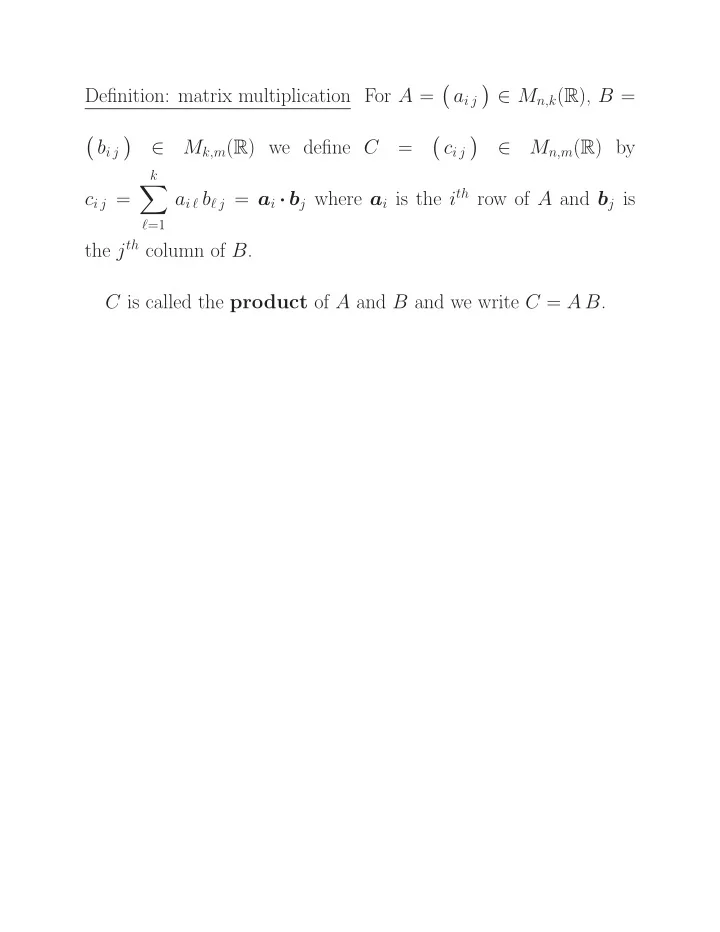

� � Definition: matrix multiplication For A = ∈ M n,k ( R ), B = a i j � � � � M k,m ( R ) we define C = M n,m ( R ) by b i j ∈ c i j ∈ k a i ℓ b ℓ j = a i · b j where a i is the i th row of A and b j is � c i j = ℓ =1 the j th column of B . C is called the product of A and B and we write C = A B .
Definition: determinant � � (i) The determinant of a 1 by 1 matrix is a . a (ii) Suppose a definition is provided for a n − 1 by n − 1 determinant. Define a 11 a 12 · · · a 1 n a 21 a 22 · · · a 2 n n � ( − 1) 1+ j a 1 j det ˜ det = A 1 j j =1 · · · · · · a n 1 a n 2 a nn A ij is the matrix obtained from A by deleting the i th row where ˜ and j th column. notes: A ij is sometimes called the ij th minor matrix of A . The matrix ˜ Think of this approach as the definition by expansion along the first row or expansion by minors along the first row .
Properties of determinants v 1 v 2 � � Let A = ∈ M n . R . . . v n 1. det A = det A t 2. Interchanging two rows (or columns) multiplies the determinant � � by − 1 For the rest of these properties, we will only mention rows — columns will follow because of property 1.
3. The determinant is linear in each row (a) Multipying a row by k multiplies the determinant by k . = k n det A � � Note that det k A (b) v 1 v 1 v 1 . . . . . . . . . det = det + det v i + v i ′ v i ′ v i . . . . . . . . . v n v n v n � � � � � � Note that det A + B � = det A + det B Note that the determinant is n –linear. 4. If two rows are proportional, the determinant is 0. 5. Adding a multiple of one row to another does not change the value of the determinant. � � � � � � 6. det = det A det B . A B
� � Let A = ∈ M n ( R ). We define the cofactor of a ij denoted a ij c ij by c ij = ( − 1) i + j det ˜ A ij . � � The matrix C = c ij ∈ M n ( R ) is called the cofactor matrix of A . � Recall that ˜ A ij is the matrix obtained from A by deleting the i th row and j th column and is sometimes called the ij th minor matrix of A ij can be called the ij th minor of A or the minor of the A . det ˜ � element a ij of A . In this context, a cofactor is sometimes called a signed minor. c ij is a scalar (real number) but ˜ Note: A ij is an ( n − 1) × ( n − 1) matrix.
We can now restate the definition of determinant in terms of cofac- tors. � � (i) The determinant of a 1 by 1 matrix is a . a (ii) Suppose a definition is provided for a n − 1 by n − 1 determinant. Define a 11 a 12 · · · a 1 n a 21 a 22 · · · a 2 n n � det = a 1 j c 1 j = a 11 c 11 + a 12 c 12 + · · · + a 1 n c 1 n j =1 · · · a n 1 a n 2 · · · a nn where c ij is the cofactor of a ij .
The transpose of the cofactor matrix C of A is called the classical adjoint of A and denoted by adj A ;i.e., adj A = C T . Theorem: If A is any square matrix, then A ( adj A ) = ( det A ) I = ( adj A ) A . In particular, if det A � = 0, the inverse of A is given by 1 A − 1 = det A adj A where adj A = C T , C being the cofactor matrix of A .
Recommend
More recommend